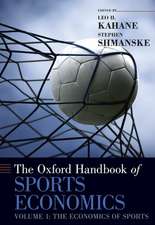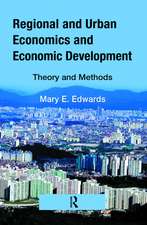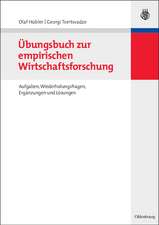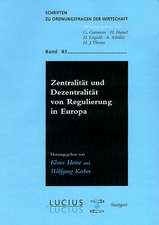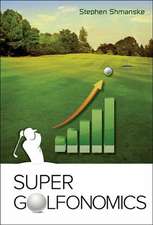The Oxford Handbook of Sports Economics Volume 2: Economics Through Sports: Oxford Handbooks
Editat de Stephen Shmanske, Leo H. Kahaneen Limba Engleză Hardback – 29 iun 2012
Shmanske and Kahane have organized over 50 essays from prominent Sports Economists into two volumes around two related themes. This second volume explains how sports helps economics via quality data used to test a variety of economic theories.
The editors have recognized two ways that economics and sports interact. First, economic analysis has helped everyone understand many of the peculiar institutions in sports. And second, quality data about individual productivity, salaries, career histories, teamwork, and managerial behavior has helped economists study topics as varied as the economics of discrimination, salary dispersion, and antitrust policy. These two themes of economics helping sports and sports helping economics provide the organizational structure to the two-volume set. The reader will find that sports economists employ or comment on practically every field in economics. Labor Economics comes into play in the areas of salary formation, salary dispersion, and discrimination. Baseball's history and the NCAA are studied with Industrial Organization and Antitrust. Public Finance and Contingent Value Modeling come into play in the study of stadium finance and franchise location. The Efficient Market Hypothesis is examined with data from gambling markets. Macroeconomic effects are studied with data from mega events like the Super Bowl, The World Cup, and the Olympics. The limits of Econometrics are pushed and illustrated with superb data in many of the papers herein. Topics in Applied microeconomics like demand estimation and price discrimination are also covered in several of the included papers. Game Theory, measurement of production functions, and measurement of managerial efficiency all come into play. Talented authors in each of these fields have made contributions to these volumes. The volumes are also rich from the point of view of the sports fan. Every major team sport is covered, and many interesting comparisons can be made especially between the North American League organization and the European-style promotion and relegation leagues. Golf, NASCAR, College athletics, Women's sports, the Olympics, and even bowling are represented in these pages. There is literally something for everyone. Readership: Economists in the field Sports Economics. Fans of sports (economists and noneconomists). Owners, field managers, back office management of professional sports franchises. College athletic directors. Student athletes. Sports talent and their agents. Students in sports economics classes.Din seria Oxford Handbooks
-
 Preț: 236.89 lei
Preț: 236.89 lei - 8%
 Preț: 358.80 lei
Preț: 358.80 lei - 17%
 Preț: 912.51 lei
Preț: 912.51 lei - 12%
 Preț: 307.94 lei
Preț: 307.94 lei - 25%
 Preț: 829.05 lei
Preț: 829.05 lei - 14%
 Preț: 987.01 lei
Preț: 987.01 lei - 26%
 Preț: 1376.97 lei
Preț: 1376.97 lei - 29%
 Preț: 929.22 lei
Preț: 929.22 lei -
 Preț: 303.54 lei
Preț: 303.54 lei - 26%
 Preț: 343.85 lei
Preț: 343.85 lei - 14%
 Preț: 278.15 lei
Preț: 278.15 lei - 29%
 Preț: 930.94 lei
Preț: 930.94 lei - 30%
 Preț: 1065.79 lei
Preț: 1065.79 lei - 15%
 Preț: 357.85 lei
Preț: 357.85 lei -
 Preț: 263.45 lei
Preț: 263.45 lei - 23%
 Preț: 839.81 lei
Preț: 839.81 lei - 16%
 Preț: 264.39 lei
Preț: 264.39 lei - 33%
 Preț: 737.68 lei
Preț: 737.68 lei - 33%
 Preț: 725.45 lei
Preț: 725.45 lei - 26%
 Preț: 342.76 lei
Preț: 342.76 lei - 25%
 Preț: 366.95 lei
Preț: 366.95 lei - 13%
 Preț: 304.72 lei
Preț: 304.72 lei - 16%
 Preț: 263.35 lei
Preț: 263.35 lei - 12%
 Preț: 267.23 lei
Preț: 267.23 lei - 33%
 Preț: 815.51 lei
Preț: 815.51 lei - 6%
 Preț: 346.76 lei
Preț: 346.76 lei - 22%
 Preț: 1095.69 lei
Preț: 1095.69 lei - 29%
 Preț: 931.18 lei
Preț: 931.18 lei - 29%
 Preț: 942.77 lei
Preț: 942.77 lei - 24%
 Preț: 1071.82 lei
Preț: 1071.82 lei - 23%
 Preț: 1052.07 lei
Preț: 1052.07 lei - 21%
 Preț: 863.03 lei
Preț: 863.03 lei - 30%
 Preț: 815.25 lei
Preț: 815.25 lei - 29%
 Preț: 855.42 lei
Preț: 855.42 lei - 30%
 Preț: 842.04 lei
Preț: 842.04 lei - 11%
 Preț: 258.32 lei
Preț: 258.32 lei - 29%
 Preț: 859.51 lei
Preț: 859.51 lei - 29%
 Preț: 1083.61 lei
Preț: 1083.61 lei - 15%
 Preț: 273.41 lei
Preț: 273.41 lei - 30%
 Preț: 818.12 lei
Preț: 818.12 lei - 11%
 Preț: 365.23 lei
Preț: 365.23 lei - 21%
 Preț: 359.87 lei
Preț: 359.87 lei - 13%
 Preț: 264.87 lei
Preț: 264.87 lei - 9%
 Preț: 307.08 lei
Preț: 307.08 lei - 28%
 Preț: 845.79 lei
Preț: 845.79 lei - 23%
 Preț: 855.11 lei
Preț: 855.11 lei - 21%
 Preț: 861.04 lei
Preț: 861.04 lei - 12%
 Preț: 250.34 lei
Preț: 250.34 lei
Preț: 869.43 lei
Preț vechi: 1313.08 lei
-34% Nou
Puncte Express: 1304
Preț estimativ în valută:
166.39€ • 173.07$ • 137.36£
166.39€ • 173.07$ • 137.36£
Carte tipărită la comandă
Livrare economică 04-10 aprilie
Preluare comenzi: 021 569.72.76
Specificații
ISBN-13: 9780195387780
ISBN-10: 0195387783
Pagini: 480
Ilustrații: 21 illustrations
Dimensiuni: 251 x 180 x 28 mm
Greutate: 0.96 kg
Editura: Oxford University Press
Colecția OUP USA
Seria Oxford Handbooks
Locul publicării:New York, United States
ISBN-10: 0195387783
Pagini: 480
Ilustrații: 21 illustrations
Dimensiuni: 251 x 180 x 28 mm
Greutate: 0.96 kg
Editura: Oxford University Press
Colecția OUP USA
Seria Oxford Handbooks
Locul publicării:New York, United States
Recenzii
Covering professional and NCAA team and individual sports, this set provides timely overviews of major sports industry issues together with empirical applications ranging from attendance to ZIP code analysis. No sports economist will want to be without this resource; all can enjoy and benefit from lucid, insightful applications of the dismal science to areas that are anything but dismal. Highly recommended.
Notă biografică
Edited by Stephen Shmanske, Professor of Economics, California State University, East Bay, and Leo H. Kahane, Associate Professor of Economics, Providence College
Professor Shmanske has taught Economics at California State University, East Bay (formerly C.S.U., Hayward) for over 30 years. Leo H. Kahane is Associate Professor of Economics at Providence College and Editor of the Journal of Sports Economics.
Contributors:
Stephen J. K. Walters, Department of Economics, Loyola University Maryland; Lawrence M. Kahn, Cornell University, CESifo, IZA, and NCER (Australia); Stephen Shmanske, Department of Economics, California State University, East Bay; Neil Longley, Isenberg School of Management, University of Massachusetts; Anthony C. Krautmann, Department of Economics, DePaul University; David J. Berri, Department of Economics & Finance, Southern Utah University; Young Hoon Lee, Department of Economics, Sogang University; Harold O. Fried, Department of Economics, Union College; Loren W. Tauer, Department of Applied Economics and Management, Cornell University; Leo H. Kahane, Department of Economics, California State University, East Bay and; Department of Economics, Providence College; David Forrest, Centre for the Study of Gambling, University of Salford; Martin B. Schmidt, Department of Economics, College of William and Mary; Richard C. K. Burdekin, Jonathan B. Lovelace Professor of Economics, Claremont McKenna; College; Rodney Fort, Department of Sport Management, University of Michigan; Robert A. Baade, A. B. Dick Professor of Economics, Lake Forest College; Karl W. Einolf, Department of Business, Accounting and Economics, Mount Saint Mary's; University; Eva Marikova Leeds, Department of Economics and Business, Moravian College; Michael A. Leeds, Department of Economics, Temple University; Rodney Paul, Department of Finance, St. Bonaventure University; Andrew Weinbach, Department of Accounting, Finance, and Economics, Coastal Carolina; University; Peter von Allmen, Department of Economics and Business, Moravian College; Bruce K. Johnson, James Graham Brown Professor of Economics, Centre College; John C. Whitehead, Department of Economics, Appalachian State University; Joseph P. McGarrity, Economics Department, University of Central Arkansas; Daniel A. Rascher, Sport Management Program, University of San Francisco; Helmut Dietl, Institute for Strategy and Business Economics, University of Zurich; Egon Franck, Institute for Strategy and Business Economics, University of Zurich; Martin Grossmann, Institute for Strategy and Business Economics, University of Zurich; Markus Lang, Institute for Strategy and Business Economics, University of Zurich; Michael Bognanno, Department of Economics, Temple University


